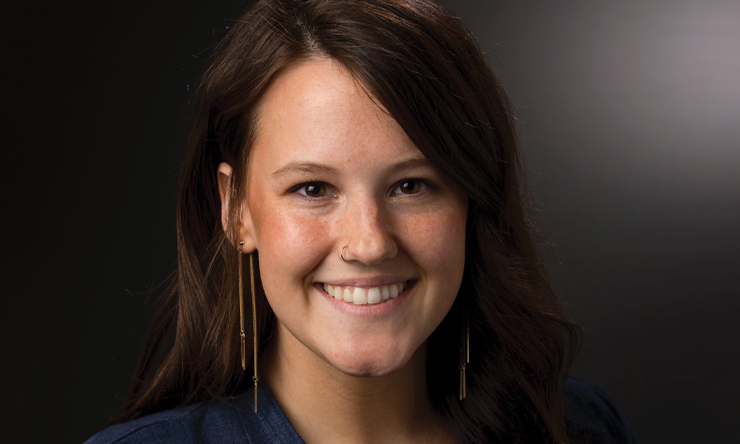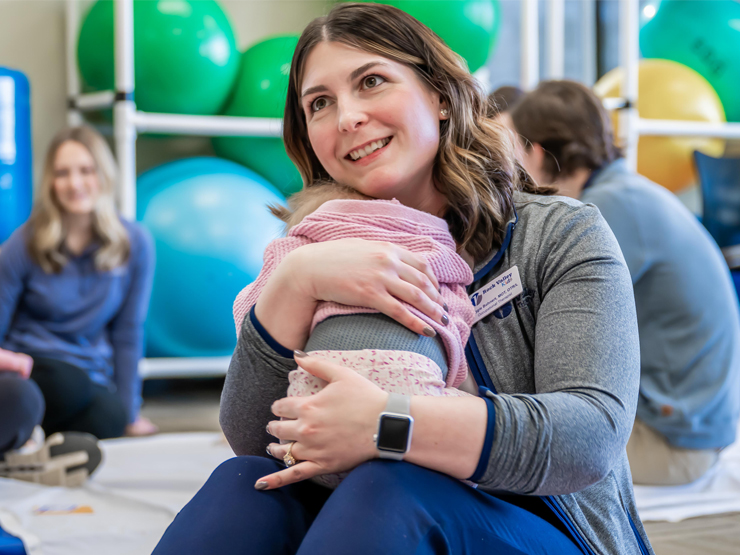The third floor Ambrose Hall office of Owen Rogal, PhD, is-he insists-not a study in chaos.
Despite the books, papers, notebooks and envelopes crowding his desk, filling the floor under his desk (maybe they didn't fall off, but they look like it), lining the walls, and spilling over every other flat surface in his office, it is perfectly organized. To prove it, Rogal jumps up from the "dangerous" oak desk chair-he seats guests in an apparently less-menacing side chair-to produce an article referenced in the interview from a box near the door. Wrong article. Never mind.
Rogal is self-deprecating, cheerful and erudite. While happily teaching Writing 101 alongside the Victorian literature courses he studied during his doctoral work, he also teaches-or has taught-such classes as cowboy literature and disabilities literature. This semester, he is team teaching Holocaust literature with Matthew Coomber, PhD, an assistant professor of theology.
Rogal's goal? To make literature personal; personally relevant, personally significant.
"My business isn't just to teach Elliot or Dickens," Rogal says, rocking on the edge of his chair. (It creaks.) "What we do here is going to matter outside. This isn't just an arbitrary requirement in gen ed. It can make life better."
It can make life better-richer-by opening doors, enriching minds, sparking ideas.
"I try to get them to write about how they feel about what they're reading," Rogal says. "In order to become excited about it, they have to have a personal experience with it. When Dorothea Brooke (in Middlemarch) realizes she is part of the palpitating universe, connected to the whole world, that's a moment that comes home to me in a very personal way. When Joe in Bleak House dies, that comes home to me in a really personal way."
Which is one of the reasons he teaches classes like cowboy, disabilities and Holocaust lit. He wants fiction to illuminate the truths in his students' lives. He wants fiction to make a profound difference.
"Students will sometimes say they don't like English," Rogal says. "That's like saying you don't like life. Novels introduce the most incredible characters, incredible situations, incredible experiences. To say English is boring is to say life is boring."
Rogal began teaching in the English Department in 1986, a transplant from the East Coast. Several things surprised him: the friendliness of his colleagues and neighbors, the high quality of his students, the crucifixes on the walls. "I grew up in a Jewish enclave," he explains. "I knew nothing about Catholicism."
He's learned a lot since, and is especially appreciative of the Catholic milieu on campus. It fits with his own philosophy-the strong sense of family and community, the commitment to social justice issues, the rigorous intellectual tradition. Especially the rigorous intellectual tradition.
"I have a fanatical belief in the importance of reading," Rogal says. "I have a fanatical belief in the importance of writing. And I have a fanatical belief in the importance of talking."
All evidenced by an office that epitomizes the lived-in history of Ambrose Hall: the bookshelves crammed full (he collects the old Penguin paperbacks among several other imprints), the pens (he collects Paper Mates), the pencils (he prefers to write with Blackwing), and five chairs to receive guests.
"Oh, I'm organized," Rogal tries again. He points at one bookshelf and then another. "Everything on that wall is 19th or 20th century. The bottom shelf there is general criticism. Over there is European lit. Cowboy lit. American lit. Writing."
Near the 19th century lit section, cowboy playmobil figures fight for space atop an old four-door steel file. A craft paper banner shouting Happy Birthday Daddy hangs above European lit. Birkenstock sandals lie kicked off under the desk.
As for the state of his organized-if-disheveled office?
"You know, it's like the natural world," he laughs, motioning around the room. "Things erode. It's like my digressive personality. I think this is actually a reflection of what's going on up here." (He taps his head).
Fortunately for us all, Rogal is willing to share the treasure that's up there.
News
Share This Story



